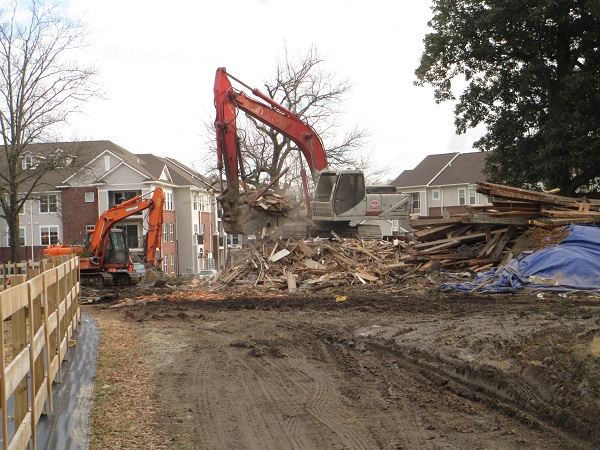One of the oldest homes in Northside is no more.
The 1800s-era Westwood house, also known as McGuire Cottage, was demolished this week at the behest of Union Presbyterian Seminary.
It owns the so-called Westwood Tract where the structure had stood for two centuries — dwarfed in recent years by the newly built Canopy at Ginter Park apartments.
Seminary spokesman Mike Frontiero said its board of trustees voted last year to demolish the structure, originally the home of Confederate surgeon Hunter Holmes McGuire, “as recognition of and in repentance for the resourcing provided to the seminary through the labor of enslaved persons.”
McGuire, one of the founders of the Medical College of Virginia and namesake of the Hunter Holmes McGuire VA Medical Center, was a personal physician to Richmond businessman Lewis Ginter and Confederate general Thomas “Stonewall” Jackson. He also authored racist writings describing Black people and others as inferior to whites.
 The decision to demolish the structure coincided with a racial reckoning across the country following the death of George Floyd and demonstrations protesting police brutality. Locally, Confederate statues — including Jackson’s — were removed from Monument Avenue and other sites, while VCU, whose health system absorbed the former MCV, de-commemorated McGuire Hall and removed other mentions of him from its campus.
The decision to demolish the structure coincided with a racial reckoning across the country following the death of George Floyd and demonstrations protesting police brutality. Locally, Confederate statues — including Jackson’s — were removed from Monument Avenue and other sites, while VCU, whose health system absorbed the former MCV, de-commemorated McGuire Hall and removed other mentions of him from its campus.
Despite its Confederate past, Westwood was considered historically significant by preservation groups such as Historic Richmond, which had put the house on its list of at-risk properties in light of Union’s interest in developing the neighboring apartments.
The house, originally built around the turn of the 19th century and added onto decades later, was not listed on state or national historic registers but was considered by the nonprofit as eligible for listing.
“We, along with many in the community, are disappointed and dismayed at the loss of one of the oldest structures in Northside,” Cyane Crump, executive director of Historic Richmond, said in an email Wednesday.
“Despite our best efforts with Preservation Virginia to work with Union Presbyterian Seminary to chart a path for restoration and reuse of this historic structure, they demolished it yesterday,” Crump said. “The house was significant as one of the oldest remaining homes in the Northside area around Sherwood Park and for its evolution as a country house.”
She added, “The building had, and the remaining portion of the Westwood site still has, much to teach us of the evolution of the area and the people whose lives were touched by it.”
In a statement that Union has posted on a website about goings-on at the Westwood Tract, Frontiero said the seminary offered to give the house away if it could be moved from the site, but the process was deemed too expensive and funds were never offered in conversations with the preservation groups.
“Names of foundations were suggested, but the seminary would have had to assign staff to research and potentially apply for grants,” the statement said. “Such staffing would have been cost-prohibitive, and the anticipated grant totals would not have come close to covering renovation costs.”
Union acquired the property following McGuire’s death in 1900, when seminary supporters raised funds to buy the farmhouse and surrounding acreage. The structure had housed seminary students over the years and most recently was used for storage.
With the house now razed, Frontiero said Union has no immediate plans for the site, though it could become part of its planned “Yaupon Place,” a multiuse greenspace that would be shared with the public and consist of the rest of the tract that’s not part of Canopy at Ginter Park.
Part of that land is leased to Shalom Farms, which manages a community garden near the house site that Frontiero said could be expanded.
The 19 acres of the tract that would comprise Yaupon Place also includes a public walking trail, older Union-owned apartments and the vacant Rice apartment building, which Frontiero said is planned to be razed as well to make way for more greenspace.
Union has said it has no plans to build more apartments on the tract, about half of which it sold to Bristol Development Group for the Canopy apartments. Completed last spring, the 301-unit complex was sold last month for nearly $84 million to Henrico-based real estate firm Capital Square. – RBizSense



